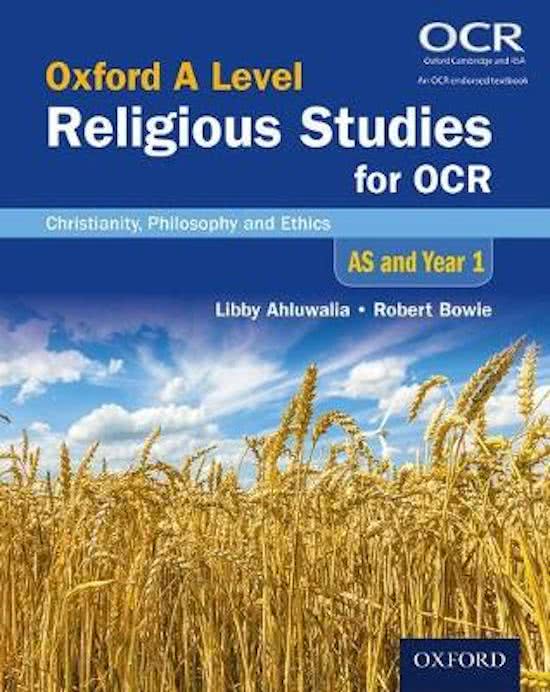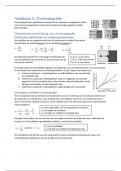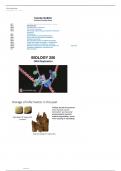Death and the Afterlife
Disembodied existence Existing without a physical body
Resurrection Living on after death in a glorified physical form in a new realm
Beatific vision A face-to-face encounter with God
Purgatory A place where people go, temporarily, after death to be cleansed of sin
before they are fit to live with God
Election Predestination, chosen by God to go to heaven or hell
Limited election The view that God chooses only a small number of people for heaven
Original sin A state of wrongdoing in which people are born because of the sin of
Adam and Eve
Unlimited election The view that people are called to salvation but only a few will be saved
Universalism The people that are all people will be saved
Parable A story told to highlight a moral message
Particular judgement Judgement for each person at the point of death
Parousia Used in Christianity to refer to the Second Coming of Christ
According to Christianity, there is life after death, not in this world but in a new kind of existence.
Christians reject reincarnation and Plato’s idea that the soul and the body could part company with the
body decomposing while the soul moves on by itself. Christianity teaches that life after death will take
the form of resurrection, where the person will be given a renewed spiritual body in which to continue
his or her journey into the next life - this is shown for Christians when Jesus’ tomb was empty,
demonstrating that he had been resurrected from death to eternal life.
In Genesis, it states that “Abraham breathed his last and died at a good old age, an old man and full
of years; and he was gathered to his people”. The phrase ‘gathered to his people’ is used for other
prominent men of the Old Testament too; it hints that the man is going to join his loved ones, but not
explicitly.
In the Book of Daniel it states: “multitudes who sleep in the dust of the Earth will awake, some to
everlasting life, others to shame and everlasting contempt”. The Book of Daniel is one of the last
books of Jewish scriptures so it could be justified the persecution that many Jewish people faced;
showing that if they kept their faith, they would be rewarded in the next life. Life after death could
therefore be used as a solution to the problem of God’s apparent injustice in this earthly life. A God of
love and justice must make it possible for those who have been faithful to be rewarded after death.
Plato’s dualism (that the soul and the body could be separated) influence Christian thinking about life
after death. Christians believe that Jesus died on the cross but was resurrected, and use this as
evidence to show that it is possible that this could happen to all of us. After Jesus’ resurrection, he
was seen as a physical person according to the Gospel accounts; he could be heard and touched,
even if the people did not recognise him immediately. He the ‘ascended into heaven’. There is no
indication whether he went with his physical body or whether it was spiritually. Most Christians believe
that Jesus continued to live in the transformed body. However, there is no indication in the Bible
whether everyone will be resurrected or whether this experience was particular to Jesus. There is also
no indication when this will happen or whether people keep their physical body or not.
Paul tried to respond to these questions; he was adamant that Christ had risen from the dead and that
this meant that all Christians could be resurrected. He argues that “the body that is sown is
perishable, it is raised imperishable; it is sown in dishonour, it is raised in glory; it is sown in
weakness, it is raised in power; it is sown a natural body, it is raised a spiritual body.” however, it
leaves the question of what exactly is a spiritual body? Paul implies that the body will be transformed
and changed, but is not clear how.
In Corinthians; “For we know that if the earthly tent we live in is destroyed, we have a building from
God, an eternal house in heaven, not built by human hands. Meanwhile, we groan, longing to be
clothed instead with our heavenly dwelling, because when we are clothed, we will not be found
naked”. The tent metaphor suggests that the bodies we have now aren’t truly us and that we will be
given a more substantial and eternal home in the afterlife. This seems to suggest that a physical life
on this earth is temporary and fragile. The second metaphor of being clothed in heaven echoes the
, Genesis story. Paul seems to say that, in this life, we are aware of our sin, but in the next life, God will
transform us so that we are not in sin anymore.
Aquinas on the afterlife
Aquinas agreed with many of Aristotle’s thoughts, but he took on a Platonic view that there was the
possibility of the soul surviving the death of the body and being capable of the ‘beatific vision’, or
coming face-to-face with God. Aquinas taught that the soul was a ‘life principle’ and also the form or
distinctive character of living things. In Aquinas’ view, all living things have souls in the sense that they
all had essential characteristics, animals had ‘sensitive souls’ and plants had ‘vegetive souls’, this
view came from Aristotle. However, Aquinas believed that human souls were different in the respect
that our souls do not die after our physical body dies. He thought that the ability to reason and think
with intelligence could not come from any physical, bodily organ but had to be non-physical. He
believed that the soul was the thing that helped people achieve their telos, the final goal and reward of
living eternally in the presence of God.
Aquinas reasoned that we can never be perfectly happy all throughout our life as happiness that we
know is brought about by material circumstances which can change. He thought that perfect
happiness could only be achieved after death. Therefore, this is eternal presence with God; in the
beatific vision, all doubt of God’s existence will be gone and the believer will see God face-to-face, he
used Paul’s quote to show this: “For now we see only a reflection as in a mirror, then we shall see
face-to-face. Now I know in part; then I shall know fully, even as I am fully known.”
If the beatific vision is eternal timeless, then there is no need to wonder what people would be doing in
heaven; there would just be one eternal moment of being in the presence of God. however, it is hard
to believe that this is the same person when they had a physical existence; we think is sequences and
respond to circumstances in our own individual ways. The difference between a person living in time
and a timeless soul, is perhaps so great that it is impossible to assert that this person experiencing
the beatific vision is really the same person after death.
Traditional Christian teaching on purgatory, heaven and hell
The story of the rich man and Lazarus in Luke's gospel gives a clear message that there will be a
separation after death between some kinds of people and others. In this story, the inhabitants of
heaven and hell are aware of each other but are unable to do anything about their position.
Heaven
Heaven is understood as the place where God lives; the metaphor of God the father is also used in
the context of heaven where heaven is seen in terms of the family home. The Lord’s Prayer, which
begins ‘Our father, who art in heaven’ and when Jesus tells his disciples that ‘my father’s house has
many rooms, if that were not so would i have told you that I am going there to prepare a place for
you?’ are further evidence that God is heaven. These convey ideas of comfort, return and familiarity
under the authority of conditional love.
Heaven is seen as a place where corruption and decay can no longer happen, where your reward is
safe forever:
“Do not store up for yourselves treasures on earth, where moths and vermin destroy, and where
thieves break in and steal. But store up for yourselves treasures in heaven, where moths and vermin
do not destroy, and where thieves do not break in and steal.” (Matthew 6)
In medieval times, heaven was thought to be literally located above the stars or what was called the
firmament. It was called the Highest Heaven since the sky is often called ‘the heavens’ as well.
Another name for this Highest Heaven was the Empyrean which was conceived to be a literal physical
place located beyond the stars as if just outside our universe. This was the dwelling place of God, and
would be the place where the Christian or the Blessed would go after their time on earth.
In modern times, we can no longer think in these terms because our ideas about the universe have
changed. Those that think heaven is a literal place where we go after death have to suppose that it is
Disembodied existence Existing without a physical body
Resurrection Living on after death in a glorified physical form in a new realm
Beatific vision A face-to-face encounter with God
Purgatory A place where people go, temporarily, after death to be cleansed of sin
before they are fit to live with God
Election Predestination, chosen by God to go to heaven or hell
Limited election The view that God chooses only a small number of people for heaven
Original sin A state of wrongdoing in which people are born because of the sin of
Adam and Eve
Unlimited election The view that people are called to salvation but only a few will be saved
Universalism The people that are all people will be saved
Parable A story told to highlight a moral message
Particular judgement Judgement for each person at the point of death
Parousia Used in Christianity to refer to the Second Coming of Christ
According to Christianity, there is life after death, not in this world but in a new kind of existence.
Christians reject reincarnation and Plato’s idea that the soul and the body could part company with the
body decomposing while the soul moves on by itself. Christianity teaches that life after death will take
the form of resurrection, where the person will be given a renewed spiritual body in which to continue
his or her journey into the next life - this is shown for Christians when Jesus’ tomb was empty,
demonstrating that he had been resurrected from death to eternal life.
In Genesis, it states that “Abraham breathed his last and died at a good old age, an old man and full
of years; and he was gathered to his people”. The phrase ‘gathered to his people’ is used for other
prominent men of the Old Testament too; it hints that the man is going to join his loved ones, but not
explicitly.
In the Book of Daniel it states: “multitudes who sleep in the dust of the Earth will awake, some to
everlasting life, others to shame and everlasting contempt”. The Book of Daniel is one of the last
books of Jewish scriptures so it could be justified the persecution that many Jewish people faced;
showing that if they kept their faith, they would be rewarded in the next life. Life after death could
therefore be used as a solution to the problem of God’s apparent injustice in this earthly life. A God of
love and justice must make it possible for those who have been faithful to be rewarded after death.
Plato’s dualism (that the soul and the body could be separated) influence Christian thinking about life
after death. Christians believe that Jesus died on the cross but was resurrected, and use this as
evidence to show that it is possible that this could happen to all of us. After Jesus’ resurrection, he
was seen as a physical person according to the Gospel accounts; he could be heard and touched,
even if the people did not recognise him immediately. He the ‘ascended into heaven’. There is no
indication whether he went with his physical body or whether it was spiritually. Most Christians believe
that Jesus continued to live in the transformed body. However, there is no indication in the Bible
whether everyone will be resurrected or whether this experience was particular to Jesus. There is also
no indication when this will happen or whether people keep their physical body or not.
Paul tried to respond to these questions; he was adamant that Christ had risen from the dead and that
this meant that all Christians could be resurrected. He argues that “the body that is sown is
perishable, it is raised imperishable; it is sown in dishonour, it is raised in glory; it is sown in
weakness, it is raised in power; it is sown a natural body, it is raised a spiritual body.” however, it
leaves the question of what exactly is a spiritual body? Paul implies that the body will be transformed
and changed, but is not clear how.
In Corinthians; “For we know that if the earthly tent we live in is destroyed, we have a building from
God, an eternal house in heaven, not built by human hands. Meanwhile, we groan, longing to be
clothed instead with our heavenly dwelling, because when we are clothed, we will not be found
naked”. The tent metaphor suggests that the bodies we have now aren’t truly us and that we will be
given a more substantial and eternal home in the afterlife. This seems to suggest that a physical life
on this earth is temporary and fragile. The second metaphor of being clothed in heaven echoes the
, Genesis story. Paul seems to say that, in this life, we are aware of our sin, but in the next life, God will
transform us so that we are not in sin anymore.
Aquinas on the afterlife
Aquinas agreed with many of Aristotle’s thoughts, but he took on a Platonic view that there was the
possibility of the soul surviving the death of the body and being capable of the ‘beatific vision’, or
coming face-to-face with God. Aquinas taught that the soul was a ‘life principle’ and also the form or
distinctive character of living things. In Aquinas’ view, all living things have souls in the sense that they
all had essential characteristics, animals had ‘sensitive souls’ and plants had ‘vegetive souls’, this
view came from Aristotle. However, Aquinas believed that human souls were different in the respect
that our souls do not die after our physical body dies. He thought that the ability to reason and think
with intelligence could not come from any physical, bodily organ but had to be non-physical. He
believed that the soul was the thing that helped people achieve their telos, the final goal and reward of
living eternally in the presence of God.
Aquinas reasoned that we can never be perfectly happy all throughout our life as happiness that we
know is brought about by material circumstances which can change. He thought that perfect
happiness could only be achieved after death. Therefore, this is eternal presence with God; in the
beatific vision, all doubt of God’s existence will be gone and the believer will see God face-to-face, he
used Paul’s quote to show this: “For now we see only a reflection as in a mirror, then we shall see
face-to-face. Now I know in part; then I shall know fully, even as I am fully known.”
If the beatific vision is eternal timeless, then there is no need to wonder what people would be doing in
heaven; there would just be one eternal moment of being in the presence of God. however, it is hard
to believe that this is the same person when they had a physical existence; we think is sequences and
respond to circumstances in our own individual ways. The difference between a person living in time
and a timeless soul, is perhaps so great that it is impossible to assert that this person experiencing
the beatific vision is really the same person after death.
Traditional Christian teaching on purgatory, heaven and hell
The story of the rich man and Lazarus in Luke's gospel gives a clear message that there will be a
separation after death between some kinds of people and others. In this story, the inhabitants of
heaven and hell are aware of each other but are unable to do anything about their position.
Heaven
Heaven is understood as the place where God lives; the metaphor of God the father is also used in
the context of heaven where heaven is seen in terms of the family home. The Lord’s Prayer, which
begins ‘Our father, who art in heaven’ and when Jesus tells his disciples that ‘my father’s house has
many rooms, if that were not so would i have told you that I am going there to prepare a place for
you?’ are further evidence that God is heaven. These convey ideas of comfort, return and familiarity
under the authority of conditional love.
Heaven is seen as a place where corruption and decay can no longer happen, where your reward is
safe forever:
“Do not store up for yourselves treasures on earth, where moths and vermin destroy, and where
thieves break in and steal. But store up for yourselves treasures in heaven, where moths and vermin
do not destroy, and where thieves do not break in and steal.” (Matthew 6)
In medieval times, heaven was thought to be literally located above the stars or what was called the
firmament. It was called the Highest Heaven since the sky is often called ‘the heavens’ as well.
Another name for this Highest Heaven was the Empyrean which was conceived to be a literal physical
place located beyond the stars as if just outside our universe. This was the dwelling place of God, and
would be the place where the Christian or the Blessed would go after their time on earth.
In modern times, we can no longer think in these terms because our ideas about the universe have
changed. Those that think heaven is a literal place where we go after death have to suppose that it is












